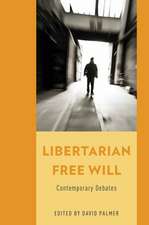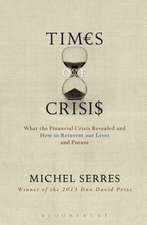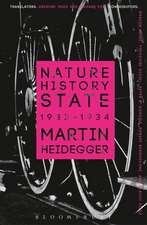Secular Mysteries: Stanley Cavell and English Romanticism
Autor Professor Edward T. Duffyen Limba Engleză Paperback – 8 mai 2013
| Toate formatele și edițiile | Preț | Express |
|---|---|---|
| Paperback (1) | 310.18 lei 6-8 săpt. | |
| Bloomsbury Publishing – 8 mai 2013 | 310.18 lei 6-8 săpt. | |
| Hardback (1) | 831.43 lei 6-8 săpt. | |
| Bloomsbury Publishing – 8 mai 2013 | 831.43 lei 6-8 săpt. |
Preț: 310.18 lei
Nou
Puncte Express: 465
Preț estimativ în valută:
59.36€ • 61.45$ • 50.17£
59.36€ • 61.45$ • 50.17£
Carte tipărită la comandă
Livrare economică 06-20 martie
Preluare comenzi: 021 569.72.76
Specificații
ISBN-13: 9781441126788
ISBN-10: 1441126783
Pagini: 304
Dimensiuni: 138 x 216 x 20 mm
Greutate: 0.36 kg
Ediția:New.
Editura: Bloomsbury Publishing
Colecția Bloomsbury Academic
Locul publicării:New York, United States
ISBN-10: 1441126783
Pagini: 304
Dimensiuni: 138 x 216 x 20 mm
Greutate: 0.36 kg
Ediția:New.
Editura: Bloomsbury Publishing
Colecția Bloomsbury Academic
Locul publicării:New York, United States
Caracteristici
Demonstrates
the
rich
interconnections
of
literature
and
philosophy
through
readings
of
Shelley,
Wordsworth,
Cavell,
Emerson
Notă biografică
Edward
T.
Duffyis
Associate
Professor
of
English
(Emeritus)
at
Marquette
University,
USA.
He
is
the
author
ofRousseau
in
England:
The
Context
for
Shelley's
Critique
of
the
EnlightenmentandThe
Constitution
of
Shelley's
Poetry.
Cuprins
1.
Stanley
Cavell's
Redemptive
Reading:
A
Philosophical
Labor
in
Progress
2.
Reading
Romanticism3.
A
Wordsworthian
Calling
of
Thinking
4.
Bursting
from
a
Congregated
Might
of
Vapors:
Desire,
Expression
and
Motive
in
Shelley
5.
"The
Breath
Whose
Might
I
Have
Invoked
in
Song":
Epipsychidion
and
Adonais
6.
Reviewing
the
Vision
of
The
Triumph
of
Life
BibliographyIndex
Recenzii
Duffy's
understanding
of
Cavell
is
clearly
profound,
and
he
has
an
impressively
detailed
and
broad
knowledge
of
a
swathe
of
Romantic
poetry.
By reading some central texts of Wordsworth and Shelley, along with those of Cavell, as efforts at the reconstruction or resettlement of the everyday, Edward Duffy recalls to us powerfully why both English Romantic poetry and Cavellian philosophy matter for us as at once 'records of losses' and 'texts of recovery.' Duffy's care, subtlety, power, and insight in this recalling will be of enormous help to anyone trying to make sense of the strange powers of these variously wonderful works that show the philosophical and the literary in engagement with each other.
Edward Duffy's approaches to Cavell's work significantly extend and consolidate Cavell's forays into Romanticism. Just as significant are his companion efforts to understand Cavell's enterprises as in themselves Romantic projects. For Cavell, in Duffy's reading, the skeptic seeks to confront and isolate the ground of knowledge in each individual knower. But skepticism yields a sense of the isolation in human knowledge that is self-imposed and inauthentic. Duffy demonstrates that the skeptic avoids the knowledge that 'we knowers' exist at a point 'where all stand single.' For Cavell's Romanticism, our separateness is not the consequence of a failure of our knowledge but a condition of being an individual. The redemption of solitude from the corrosiveness of a skeptical self-consciousness makes possible an openness to companionship. Through this book's painstaking attention to the details of a poem, we learn of the specific possibilities of poetry as embodying and acknowledging the human voice. Through his careful attention to the steps of Cavell's reflections, Duffy brings us to the territory where philosophy and poetry meet. The effect is stunning.
Brilliantly appropriating Stanley Cavell's rich and complex approach to literary expression as an investigation into our common linguistic inheritance, Edward Duffy explores Wordsworth and Shelley's poetry as a way into the 'secular mysteries' of the ordinary. Treating romanticism as a transatlantic phenomenon-instantiated on the American side in Emerson and Thoreau-Duffy finds our efforts to locate routes of significance in the everyday in what he persuasively shows to be something of a lacuna in Cavell's thought: a sustained reflection of English romanticism. The prose is throughout perceptive and crisp, and the readings are shrewd and original.
By reading some central texts of Wordsworth and Shelley, along with those of Cavell, as efforts at the reconstruction or resettlement of the everyday, Edward Duffy recalls to us powerfully why both English Romantic poetry and Cavellian philosophy matter for us as at once 'records of losses' and 'texts of recovery.' Duffy's care, subtlety, power, and insight in this recalling will be of enormous help to anyone trying to make sense of the strange powers of these variously wonderful works that show the philosophical and the literary in engagement with each other.
Edward Duffy's approaches to Cavell's work significantly extend and consolidate Cavell's forays into Romanticism. Just as significant are his companion efforts to understand Cavell's enterprises as in themselves Romantic projects. For Cavell, in Duffy's reading, the skeptic seeks to confront and isolate the ground of knowledge in each individual knower. But skepticism yields a sense of the isolation in human knowledge that is self-imposed and inauthentic. Duffy demonstrates that the skeptic avoids the knowledge that 'we knowers' exist at a point 'where all stand single.' For Cavell's Romanticism, our separateness is not the consequence of a failure of our knowledge but a condition of being an individual. The redemption of solitude from the corrosiveness of a skeptical self-consciousness makes possible an openness to companionship. Through this book's painstaking attention to the details of a poem, we learn of the specific possibilities of poetry as embodying and acknowledging the human voice. Through his careful attention to the steps of Cavell's reflections, Duffy brings us to the territory where philosophy and poetry meet. The effect is stunning.
Brilliantly appropriating Stanley Cavell's rich and complex approach to literary expression as an investigation into our common linguistic inheritance, Edward Duffy explores Wordsworth and Shelley's poetry as a way into the 'secular mysteries' of the ordinary. Treating romanticism as a transatlantic phenomenon-instantiated on the American side in Emerson and Thoreau-Duffy finds our efforts to locate routes of significance in the everyday in what he persuasively shows to be something of a lacuna in Cavell's thought: a sustained reflection of English romanticism. The prose is throughout perceptive and crisp, and the readings are shrewd and original.














